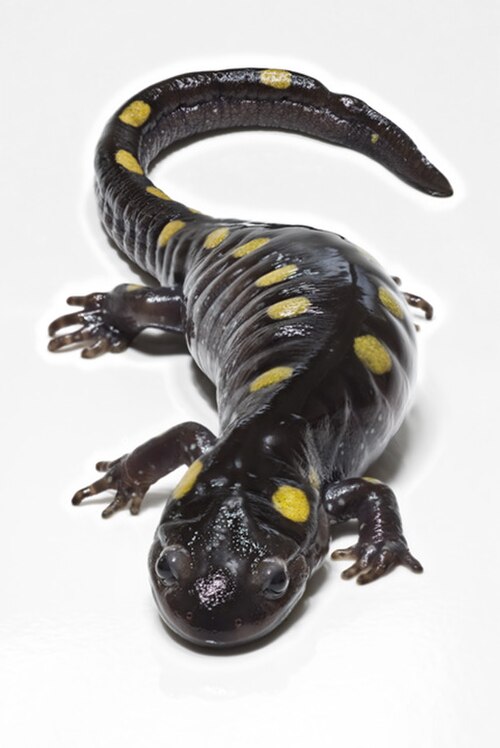Frognoun
A small tailless amphibian of the order Anura that typically hops.
Frognoun
The part of a violin bow (or that of other similar string instruments such as the viola, cello and contrabass) located at the end held by the player, to which the horsehair is attached.
Frognoun
(Cockney rhyming slang) Road. Shorter, more common form of frog and toad.
Frognoun
The depression in the upper face of a pressed or handmade clay brick.
Frognoun
An organ on the bottom of a horse’s hoof that assists in the circulation of blood.
Frognoun
(rail transport) The part of a railway switch or turnout where the running-rails cross (from the resemblance to the frog in a horse’s hoof).
Frognoun
(offensive) A French person.
Frognoun
A French-speaking person from Quebec.
Frognoun
A leather or fabric loop used to attach a sword or bayonet, or its scabbard, to a waist or shoulder belt.
Frognoun
An ornate fastener for clothing consisting of an oblong button (covered with netted thread), toggle, or knot, that fits through a loop.
Frogverb
To hunt or trap frogs.
Frogverb
To use a pronged plater to transfer (cells) to another plate.
Frogverb
To spatchcock (a chicken).
Frogverb
To ornament or fasten a coat, etc. with frogs.
Frogverb
(transitive) To unravel (a knitted garment).
Frognoun
An amphibious animal of the genus Rana and related genera, of many species. Frogs swim rapidly, and take long leaps on land. Many of the species utter loud notes in the springtime.
Frognoun
The triangular prominence of the hoof, in the middle of the sole of the foot of the horse, and other animals; the fourchette.
Frognoun
A supporting plate having raised ribs that form continuations of the rails, to guide the wheels where one track branches from another or crosses it.
Frognoun
An oblong cloak button, covered with netted thread, and fastening into a loop instead of a button hole.
Frognoun
The loop of the scabbard of a bayonet or sword.
Frogverb
To ornament or fasten (a coat, etc.) with trogs. See Frog, n., 4.
Frognoun
any of various tailless stout-bodied amphibians with long hind limbs for leaping; semiaquatic and terrestrial species
Frognoun
a person of French descent
Frognoun
a decorative loop of braid or cord
Frog
A frog is any member of a diverse and largely carnivorous group of short-bodied, tailless amphibians composing the order Anura (literally without tail in Ancient Greek). The oldest fossil appeared in the early Triassic of Madagascar, but molecular clock dating suggests their origins may extend further back to the Permian, 265 million years ago.
Salamandernoun
A long, slender, chiefly terrestrial amphibian of the order Caudata, superficially resembling a lizard.
Salamandernoun
(mythology) A creature much like a lizard that is resistant to and lives in fire, hence the elemental being of fire.
Salamandernoun
(heraldry) A heraldic representation of the mythological creature, typically accompanied by flames.
Salamandernoun
(cooking) A metal utensil with a flat head which is heated and put over a dish to brown the top.
Salamandernoun
(cooking) A small broiler (North America) or grill (Britain), used in professional cookery primarily for browning.
Salamandernoun
The pouched gopher, Geomys tuza, of the southern United States.
Salamandernoun
A large poker.
Salamandernoun
(metallurgy) Solidified material in a furnace hearth.
Salamanderverb
To use a salamander (cooking utensil) in a cooking process.
Salamandernoun
Any one of numerous species of Urodela, belonging to Salamandra, Amblystoma, Plethodon, and various allied genera, especially those that are more or less terrestrial in their habits.
Salamandernoun
The pouched gopher (Geomys tuza) of the Southern United States.
Salamandernoun
A culinary utensil of metal with a plate or disk which is heated, and held over pastry, etc., to brown it.
Salamandernoun
A large poker.
Salamandernoun
Solidified material in a furnace hearth.
Salamandernoun
any of various typically terrestrial amphibians that resemble lizards and that return to water only to breed
Salamandernoun
reptilian creature supposed to live in fire
Salamandernoun
fire iron consisting of a metal rod with a handle; used to stir a fire
Salamander
Salamanders are a group of amphibians typically characterized by a lizard-like appearance, with slender bodies, blunt snouts, short limbs projecting at right angles to the body, and the presence of a tail in both larvae and adults. All 10 present-day salamander families are grouped together under the order Urodela.






























